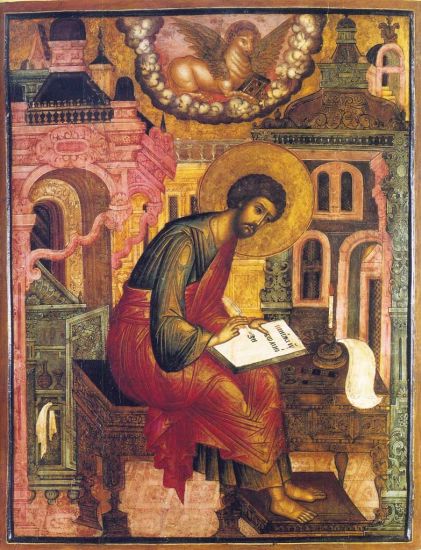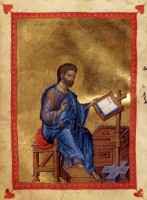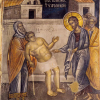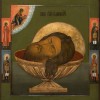Is a candle brought to be put under a bushel, or under a bed? and not to be set on a candlestick? (Mark 4:21)
 In the Name of the Father, and of the Son, and of the Holy Spirit!
In the Name of the Father, and of the Son, and of the Holy Spirit!
Dear brothers and sisters in Christ,
The most terrible night in human history began in silence. In this silence, in a house cooled by a nearby garden, there slept a young man. Suddenly, his sweet sleep was interrupted by the clanging of metal, excited voices, and coarse screams. The young man leapt out of bed and, hastily wrapping a piece of linen around his unclad body, ran from the house. He thought that robbers had broken into the garden belonging to his family. But what he saw turned out to be far worse than any robbery: a vicious mob, bristling with weapons, surrounded the Divine Teacher. The young man was able to catch the words Jesus spoke to His enemies:
Are ye come out, as against a thief, with swords and with staves to take Me? I was daily with you in the temple teaching, and ye took Me not: but the scriptures must be fulfilled (Mark 14:48-49). The young man saw how the jeering mob led the Teacher away; he saw how his elder brethren, the closest disciples of Jesus, ran away. How can one leave the Teacher alone in such calamity? This thought stung the young man’s heart, and he began to follow the crowd. Then one of the guards turned to him, he saw a cruel face, and someone’s rough hands grabbed him. The young man fled. The cover with which he had wrapped himself remained in the guard’s hands. He, too, ran away: miserable and naked, driven by fear and shame…
The name of this young man who tried to share in the Lord’s solitude in the garden of Gethsemane was John. Under his other name, his apostolic designation of Mark, he entered Sacred History as the author of one of the divinely-inspired Gospels and as the founder of one of the great Churches.
St. John-Mark came from a pious family, readily accepting the preaching of Jesus of Nazareth and hoping to see in Him the long-awaited Savior of the world. The Lord Jesus would often come to this family’s property, to the shaded garden of Gethsemane, to pray in solitude. That is why St. Mark was nearby at the hour of Gethsemane. Christ deigned to choose the house of Mary, the mother of St. John-Mark, for His Mystical Supper. This same blessed house later became a refuge and place of prayer for Christ’s Apostles; the Apostle Peter came here after the Angel had freed him from his fetters and led him out of prison. The chosen heralds of the Gospel knew and loved the young John-Mark, whom the Savior Himself had chosen to be among the seventy lesser Holy Apostles.
Nonetheless, this young man did not initially stand out in any way from Christ’s other followers. His cousin, St. Barnabas – also one of the Holy Apostles of the seventy – was much better known: he played a special role in the fate of the newly-converted Saul, who was to become Paul, chief herald of the Gospel. It was at the suggestion of St. Barnabas that the Holy Apostle Paul took the former’s young relative with him on his first evangelic journey. Leaving for his travels through the Roman Empire, the young John took the Roman name Mark, which was consonant with his mother’s name, Mary. In those days, however, the young man was still soft and weak. Having grown faint on the mountain trails of Pamphylia, he became a burden to the great work of the enlightenment of the nations. On his second journey, the Apostle Paul refused to take him.
 This fragile, timid, soft young man, who had fled naked from the guards in Gethsemane, who had cried from exhaustion on the steep mountain roads… Who could have imagined that over the centuries his symbol would become the mighty lion, with six wings about him; and they were full of eyes within: and they rest not day and night, saying, Holy, holy, holy, Lord God Almighty, which was, and is, and is to come (Revelation 4:8)? Now a winged lion holding a Gospel is depicted on the seal of the ancient Church of Alexandria, the first Patriarch of which was the Holy Apostle Mark.
This fragile, timid, soft young man, who had fled naked from the guards in Gethsemane, who had cried from exhaustion on the steep mountain roads… Who could have imagined that over the centuries his symbol would become the mighty lion, with six wings about him; and they were full of eyes within: and they rest not day and night, saying, Holy, holy, holy, Lord God Almighty, which was, and is, and is to come (Revelation 4:8)? Now a winged lion holding a Gospel is depicted on the seal of the ancient Church of Alexandria, the first Patriarch of which was the Holy Apostle Mark.
When the young John-Mark, after an unsuccessful beginning to his labors, returned to Jerusalem, the Apostle Peter drew him near, transferring to the son the feeling of gratitude he had felt for his pious mother. Later, St. Mark was to become the closest and most beloved of the Apostle Peter’s spiritual children, becoming the mouthpiece for his divinely-inspired preaching.
St. Mark performed a courageous deed in Jerusalem. He came from the tribe of Levi, that is, from the clergy estate. But when, as a Levite, he became compelled to serve in the Temple of Jerusalem, the very thought struck him as repugnant. How could he enter the Temple, which had become graceless; the veil of which had been torn after Christ’s crucifixion; from which God had departed; and where the abomination of desolation reigned? How could he associate with the deicidal Pharisees, who had condemned the Son of Man to death? To renounce the old, transgressing Judaism, St. Mark cut off his thumb. Such a physical handicap, by Old Testament standards, rendered him unsuitable for priestly ministry. After this action, St. Mark received the designation of the “stump-fingered” [ho kolobodaktulos]. The keepers of the law were strict about physical defects, all the while paying no mind to their own spiritual defects. The New Testament of the Lord enjoins us not to care about externals, but rather about the human soul. And St. Mark was destined for a higher, episcopal, service.
Under the Apostle Peter’s influence, St. Mark matured, toughened, and grew in spirit. Within several years the Apostle Paul himself, upon meeting St. Mark again, marveled at the change he had undergone, considering him a worthy companion. Thus he participated in the labors of both chief Apostles. Long journeys no longer frightened St. Mark. Along with his elder brethren, and later alone, he traveled to Seleucia, Cyprus, the Italic lands, Antioch, Ephesus, and inner Africa, everywhere preaching Christ the Savior. St. Mark struggled so zealously in prayer and fasting, leading such a lofty way of life, that the Therapeutae – a Jewish community of adherents to the strictest piety – admiring his righteousness, converted to Christ. His words and deeds were inspired by the Holy Spirit, as evidenced by miracles and signs.
By orders of the Apostle Peter, he proclaimed the Truth of Christ in Aquileia, the second most important city in Italy at the time, which was often visited by the Roman Emperors. (It is not far from the location in Venice where the Apostle Mark’s holy relics repose; on top of a tall pillar rising over the Adriatic is his symbol: the winged lion.) When there were false teachers in Colossae, leading people astray in faith, the Apostle Paul sent St. Mark there as a man of spiritual experience to combat philosophy and vain deceit, after the tradition of man, after the rudiments of the world, and not after Christ (Colossians 2:8).
St. Mark became not just a support for his great teachers, but also a source of comfort in affliction. Languishing in a Roman prison, the Apostle Paul names St. Mark among the few fellowworkers unto the kingdom of God, which have been a comfort unto me (Colossians 4:11). In an epistle written shortly before his martyric end, the Apostle Peter calls his beloved pupil simply Marcus my son (1 Peter 5:13). In Rome, St. Mark remained close to the chief Apostles right up until they received their crowns of martyrdom from the hands of the pagans. The earthly ministry of their younger brother, St. Mark, was soon to be crowned by the same.
As the “mouthpiece of the great Apostle Peter,” St. Mark set down his words of good tiding in written form, thereby preserving them for the ages. The Gospel according to Mark was compiled by request of the Roman Christians on the basis of the chief Apostle’s accounts; it was reviewed and approved of by St. Peter himself. Later, the Holy Apostle John the Theologian testified the following about him: “Mark having become the interpreter of Peter, wrote down accurately whatsoever he remembered” of the Lord’s teaching and deeds. [1] The Gospel according to Mark, as truly divinely-inspired, entered the canon of the New Testament.
It is no accident that the mighty lion became the symbol of the Holy Evangelist Mark. The good tidings written by him are addressed to the nations of the world, proclaiming the visible manifestation of the power of God, the omnipotence of Christ the Savior, which saves the human race. The main point of this bright and concise account, comprehensible even to children, is the news that the Son of God has come into the world to return the Heavenly Father’s love to people. The scenes of Christ’s great miracles and signs immutably confirm that the Savior should be obeyed not just as a teacher of morality, but as the Merciful Lord come in power, and that those who hearken unto Him will inherit eternal life.
The Gospel according to Mark was intended for Christians who had converted from paganism, people who had no part in the disputes of the Jewish interpreters of the law. The Holy Evangelist Mark imprinted in their minds the image of Christ the Victor, triumphing over universal evil. The first victory of Jesus was over the devil, the father of lies, who vainly tempted the Son of Man in the wilderness. Trampling upon the enemy’s treachery, the Savior commandingly expels evil spirits, forbidding them to torment people – and His word even expels a whole legion of demons, which entered a herd of swine that fell into the sea. Christ heals human sicknesses: He cleanses lepers; He raises the paralyzed to their feet; He returns sight, hearing, and the gift of speech to the unfortunate. He simultaneously cures the most terrible spiritual malady: He heals sin. Even death retreats from before the Son of Man: He commands, and the deceased daughter of Jairus rises from her deathbed. People fear the violence of the elements, but now even the elements humble themselves before Jesus: the menacing storm obeys Him, and He walks on water as on dry land. People fear for their needs, but Christ gives generously of bodily food to those that hear the word of God: He miraculously feeds thousands upon thousands of the hungry with a few loaves and fish.
For those who follow the Savior, there is nothing left to fear in this world. But universal wickedness rages to undermine Jesus Christ; it finds servants for its cause in the falsely-righteous Pharisees, the falsely-wise scribes, and the Herodian politicians. The treachery of the sons of perdition drive the Incarnate Son of God to death on the Cross, but the monstrous deicide they committed is transformed into the ultimate victory of Christ the Redeemer: His glorious Resurrection, which accomplishes the salvation of humanity from the bondage of the devil, sin, and death. The Risen Lord ascends into Heaven, showing people the way to the Kingdom of God. Thus are the deeds of our Lord and Savior, Jesus Christ, delineated in the Gospel according to Mark.
St. Mark calls his account the beginning of the gospel (Mark 1:1), that is, the first step leading to the heights of the true knowledge of God. Indeed, in embarking on the path of faith, it is easiest of all to begin one’s study of the New Testament with the Gospel according to Mark, with its brilliance, simplicity, and fine succinctness. St. Mark gives more attention to the miracles and signs testifying to Christ’s Divine power than to the profundity of His teaching. But it is here that we learn the very foundation of Christian life from the Lord’s own mouth: If any man desire to be first, the same shall be last of all, and servant of all (Mark 9:35). It is also here that we learn how the Savior summarizes the entire essence of human righteousness in the fulfillment of the two commandments of love: love for God and love for neighbor. From the ocean of Divine Teaching, the Holy Evangelist selects that which is most important and vital for man. This is pure spiritual milk; having tasted of it, Christians can strive for the solid food of higher truths.
By writing a Gospel based on the accounts of the Apostle Peter, St. Mark set down the humility of his teacher: here much is said about the weaknesses of the chief Apostle, but the details emphasizing the loftiness of his calling, found in the other Evangelists, are absent. St. Mark’s delicate soul appears in the careful tremulousness with which he describes the miracles Christ performed for children, citing the words of the Savior: Suffer the little children to come unto Me, and forbid them not: for of such is the kingdom of God (Mark 10:14). It has been suggested that the Gospel according to Mark is a handbook for Christian parents for use in educating their children, or that it is addressed directly to children. That, of course, is one way of interpreting the holy simplicity of this account. One should not forget, however, what the Lord Jesus said: Verily I say unto you, Whosoever shall not receive the kingdom of God as a little child, he shall not enter therein (Mark 10:15). These words sound a stern warning to those who strive for difficulty where childlike purity of heart is needed, who try to philosophize where childlike simplicity of faith is needed. No lofty matters, no philosophizing or theologizing, will save a man’s soul if he cannot acquire with childlike purity and simplicity the truths taught by Mark’s good tidings.
The lot of apostolic teaching in a land of refined, pagan complexity fell to the pure and simple heart of St. Mark. He founded the Church of Christ in Egypt, a country of ancient magical rituals and abounding in pagan priests and sorcerers, connoisseurs of dark satanic wisdom. He served as bishop in Alexandria, Egypt, the center of ancient civilization. It boasted the finest library in the world and was renowned for its philosophers, orators, men of letters, and scholars in all areas of worldly knowledge. Yet the Apostle Mark’s simplicity proved to be stronger than this heap of pagan magic and learning.
Guided by the Holy Spirit, the Apostle Mark preached as one having authority, with invincible power of word and deed. He was accompanied by the glory of wonderworking. A single word from St. Mark healed the sick and made fierce demons flee; “shrines fell, idols were overthrown, and the people were purified and enlightened, being Baptized in the Name of the Father, and of the Son, and of the Holy Spirit.” [2] Churches in the cities of Egypt multiplied, grew, and strengthened. In order to counteract the evil sophistry of the pagans, St. Mark founded a Christian catechetical school in Alexandria, which was to become a stronghold of true enlightenment: from within its walls were later to come great teachers and Fathers of the Church: Saints Clement and Dionysius of Alexandria and Gregory the Wonderworker.
St. Mark’s works aroused the furious wrath of the pagans, who saw how he exposed their lies and wickedness. Finally, inflamed by their orgies in honor of the local god Serapis, they dared attack Christ’s Apostle. An ungodly crowd burst into the Christian church in which St. Mark was celebrating the divine services. The pagans bound the Apostle and dragged him face down through the streets of Alexandria, which were paved with sharp stones. At night the Lord’s passion-bearer was taken to prison, where the Sweetest Jesus Himself appeared to him, promising eternal blessedness in reward for his brief torments.
The following day the pagans again began to drag St. Mark, who was covered in blood, through the streets. The Apostle died in the midst of these sufferings, glorifying God, and his pure soul flew to the Kingdom of Heaven. The ungodly wanted to burn his body, but a sign of wrath came from the Almighty: sudden darkness, a terrible thunderstorm, and an earthquake. This caused them to scatter in terror. The Christians reverently laid the Apostle Mark’s body in a stone tomb, over which a church was later built.
The winged, many-eyed lion soaring over the universe, proclaiming the Glory of the Lord – such is the symbol of St. Mark, the divinely-inspired Evangelist, valiant Apostle, great hierarch and wonderworker, and courageous passion-bearer of Christ. The path of St. Mark is a human path that leads, by the grace of God, from fear and weakness to great accomplishment, power, and eternal glory.
Beloved brothers and sisters in the Lord!
How generously did the Son of God reward that burst of love that once enticed the young John-Mark to follow Jesus on the terrible night in Gethsemane! How wonderfully did the Holy Spirit transform this timid young man, granting him spiritual might, wisdom, and a lion’s courage and perseverance in trials! How brightly has the Apostle and Evangelist Mark shone over the centuries, a beacon for all generations of Christians! Let us remember that the All-Bountiful God requires only our good will, only our sincere desire for Him – and then the Lord will bestow upon us His all-conquering grace.
And now, brightly celebrating the memory of St. Mark, who enlightens us with the Light of Christ, let us chant to him with hope for saving and spiritual gifts: When thou hadst received the Spirit’s grace from Heaven’s heights, thou rentest apart the webs of the philosophers; and catching all of the nations in thy net, O all-lauded Mark, thou didst offer them to thy Lord by preaching the Gospel of divine renown. [3] Amen.
Translated from the Russian.
Translator’s notes:
[1] Words preserved in the fragments of Papias.
[2] From the Life of St. Mark, as compiled by St. Dimitri of Rostov.
[3] Kontakion, second tone.



















